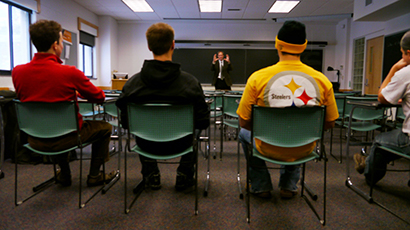Digital media technology, when deployed in ways that cultivate shared learning communities in which students and teachers are empowered to participate as partners in conjoint educational practices, can transform the way we teach and learn philosophy. This essay offers a model for how to put blogging and podcasting in the service of a cooperative approach to education that empowers students to take ownership of their education and enables teachers to cultivate in themselves and their students the excellences of dialogue. The essay is organized around a compelling story of how the students in an Ancient Greek Philosophy course responded to an anonymous, belligerent commenter on the blog from outside of the class. The incident brings the pedagogy of cooperative education into sharp relief.
I am also embedding here a video the students in the class made with me after the course was over. In the video, we speak only words we wrote on the blog in order to capture something of the spirit of the conversation we had over the course of the semester.
The full text of Cultivating Communities of Learning through Digital Media is available for download on from the Humanities Commons.


Hi Chris,
I am very interested in reading the full article. Thanks.
Jeff
me too please.
ps just got your book and will be interested to see if/how you get around/through all of the antifoundationalist/neo-pragmatist worries about anything non-human getting a say. have you ever written about Foucault’s later ventures into ancient Greece?
thanks for sharing the article and for making some of the behind the scenes aspects of the blog available. I’m heartened by your efforts to go beyond the transmission of information into the realm of habit formation and democratic habit formation in particular, this is a leap forward from the indoctrinations into, thought/vocabulary policing of, “critical” thinking that came into vogue in the 80’s. My worries remain however that there just isn’t the kind of time/commitment available needed to really replace old habits with new ones, and that in particular scholarly habits like say close readings and rewriting in the service of getting something or especially some one ‘right’ before moving to make some use/judgment of them. One suggestion would be to radically shorten reading lists to maybe one or two texts and going deep instead of wide, including more historical context and some sense of how to achieve a surer (&more respectful) grasp of what is at hand. I think that we need to be aware of not just students interests (tho that is a vital Deweyan starting point) but also their lacunae.
ps at the Dean level imagine if these kinds of democratic values/practices were widened to include all aspects of the educational experience including dorm living and other student activities, and then perhaps extended into the community beyond the campus…
I share your concern about the difficulty of changing habits and the time required to do it well. I also like the suggestion that we reduce the reading lists on syllabi to encourage deeper reading and engagement. I think I over extended a bit in Critical Theory last fall.
As for my role as Dean, I am working on bringing this model to the wider university community. Here is the link to the Liberal Arts Undergraduate Studies blog site: http://www.psu.edu/dept/laus/
We are trying to give students the opportunity to give voice to their Liberal Arts experience.
that’s excellent, not sure if this is more of a pipe-dream than an untimely meditation but I can’t help thinking of,wishing for, a civic-minded center of higher ed that treats students as response-able citizens in the making and not as full-fledged customers (I’m naively captivated by moving images of Japanese school children collectively cleaning their classrooms). Not sure what the market would be for such an experiment but we know what the skyrocketing costs of business as usual are…